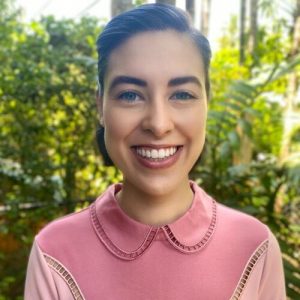Claire Helpingstine
 Fourth-year doctoral student Claire Helpingstine believes that many students view fellowships as just another opportunity for rejection, but she takes a different approach. She believes that the possibility of rejection can be a pathway to improvement.
Fourth-year doctoral student Claire Helpingstine believes that many students view fellowships as just another opportunity for rejection, but she takes a different approach. She believes that the possibility of rejection can be a pathway to improvement.
“In order to combat this thinking, it is best to view fellowship applications as an opportunity to practice marketing yourself and your project to somebody other than your committee members,” Claire says. “This is a skill that will be necessary for the rest of our careers regardless of whether we choose the academy or industry.”
That attitude has benefitted Claire, as she has been admitted to the Global Health Equity Scholars Program as a 2020-2021 U.S. Predoctoral Student Scholar. The Scholars Program is a one-year global health research program for students who are interested in global health. Sponsored by the Fogarty International Center at the National Institutes of Health, the fellowship provides research fellows with an opportunity to research and work in 16 countries at 19 different international sites to experience different diseases and health-related conditions in developing countries. The program includes a stipend, health insurance, modest research supply costs, and travel costs to and from the international field site.
Claire’s fellowship site is the Public Health Research Institute of India (PHRII). Her research project aims to study commercial sexual exploitation (CSE) and its associated health outcomes by using an individual interview approach to analyze the social and cultural structures surrounding CSE in South India.
Originally from Lassen County, California, Claire received a BS degree in Psychology from Barry University. She chose FIU for her doctoral studies because of her desire to work with Dr. Maureen Kenney in the Department of Counseling, Recreation and School Psychology. Claire’s research examines the ways in which factors such as gender, race, and culture, in addition to key social network processes, inform perceptions and experiences of sex trafficking. She hopes to use the skills acquired during her PhD program to work with communities to create change within the U.S. and globally.
“Sex trafficking has become a ‘hot’ topic in a number of different spheres, and with that has come a number of opposing viewpoints on how to address the issue,” Claire says. “I think what predominantly drives my research interest, however, is the social justice lens through which I view this phenomenon.”
Claire initially learned about the NIH Fogarty Center Pre-Dissertation Fellowship through her primary mentor, Dr. Dionne Stephens. She believes several factors contributed to her winning application, including having experience submitting other fellowship applications and having a strong history working with female sex trafficking victims in the United States. Additionally, Claire gives credit to Dr. Purnima Mahivanan, the GHES Program Director for FIU, who helped her connect to key personnel at PHRII.
Claire believes that applying for competitive fellowships is important because you never know what might come of it. “If it interests you, and you think your research is a good fit, there is really no harm in trying,” she says.
“Further, each time you apply for a fellowship, you are provided with the ability tighten your project. Often times, a rejected application will include valuable feedback from reviewers which you can then take on board in order to strengthen your next application or project idea in general. Overall, even if you do not get the fellowship, you can gain a number of valuable skills by just applying. This, in and of itself, makes applying to fellowships worth it.”



